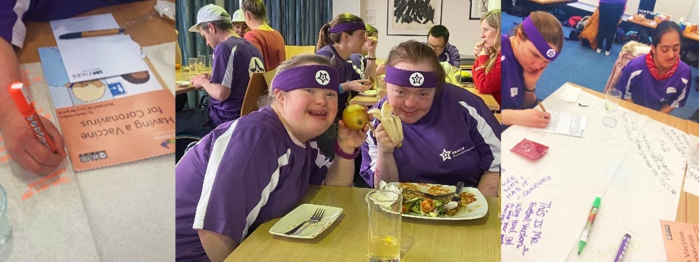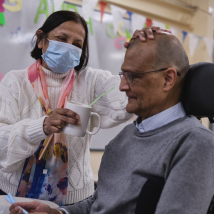This article showcases the vital work of our ARC East of England researchers who continue to address the ongoing effects of COVID-19 in their projects across our region.
Over a four week twitter campaign in June and July 2022, ARC EoE highlighted eight key research projects contributing to health and social care service recovery from the COVID-19 pandemic.
There are four impact themes:
- Uptake and understanding of the COVID-19 vaccine;
- Addressing health inequalities;
- Supporting health and care staff;
- COVID-19 and care homes.
This article summarises each project, including project aims, what the researchers found and what this means for our local communities. More information on the campaign can be found on our ARC EoE Twitter where there are also short video interviews with the researchers.
Uptake and understanding of the Covid-19 vaccine
1) Beyond Words: co-creation and evaluation of a visual resource to support COVID-19 vaccine uptake in people with intellectual disabilities (CAREVIS)
The aim of this research is to develop, and then evaluate, the usefulness and impact of a new pictorial resource about the COVID-19 vaccine for people with intellectual disabilities and their carers (family, friends and ‘formal’ carers). In collaboration with ‘Books Beyond Words’ charity, the fantastic wordless picture resource has been produced - ‘Having a coronavirus vaccine' - providing an accessible and engaging explanation of the COVID-19 vaccination programme to people with a learning disability.
The CAREVIS project team has been working with the Purple All Stars learning disability collective on the design and evaluation of the new pictorial resource. This blog shares their insights on innovative partnership working and co-production in action, supported by the Inclusive Involvement in Research and Prevention and Early Detection in Health and Social Care ARC EoE themes. Read blog here

The Purple All Stars at work with CAREVIS researchers
2) Developing a co-designed intervention to increase COVID-19 vaccination confidence among young people and their parents in the Black African and Caribbean communities in Watford
Researchers from our Prevention and Early Detection in Health and Social Care theme, Dr Daksha Trivedi and Dr Claire Thompson (University of Hertfordshire) are supporting colleagues at Community Development Hertfordshire, Hertfordshire County Council, Watford Borough Council, and Healthwatch to design and deliver a consultation on vaccine confidence in 12-16 year old children and their parents among the African / Caribbean community in Watford.
Why is this research needed? The risk of dying from Covid-19 is higher in those living in the more deprived areas, and higher in those in ethnic minority groups, including Black African and Black Caribbean, non-British White, and some Asian groups such as those with Pakistani/Kashmiri heritage. Some of these groups are also seeing lower take-up rates of vaccines at present than the rest of the population, posing further risk to their health and wellbeing.
Addressing health inequalities and the COVID-19 pandemic
3) A scoping review of the evidence base on approaches to improving quality of data relating to health inequalities
A year of Covid-19 has starkly highlighted the health inequalities that exist in England. This project aims to identify and review the evidence base on approaches taken within the health and care system to improve the quality of data used for the identification and monitoring of health inequalities. Researchers from our Population Evidence and Data Science theme, Dr Louise Lafortune and Dr. Sowmiya Moorthie (University of Cambridge) are principal researchers in this project.
4) The impact of COVID-19 on food systems and practices in the East of England
This project is a qualitative study of how Covid-19 has affected the food and eating practices of people across the East of England. From May 2020 - April 2021, the project team interviewed East of England residents, community stakeholders and professionals involved in food provision about how people across the region are managing with their food and how they are being supported locally.
Findings were shared in a series of policy briefings, tailored to four population groups and include policy recommendations for their specific needs in relation to food and health inequalities
Researcher Dr Claire Thompson (University of Hertfordshire), from our Prevention and Early Detection in Health and Social Care theme, in the principal investigator in this project.
See short animation below from researchers at the University of Hertfordshire and NIHR ARC East of England shares ideas to improve access to nutritious and affordable food in our region with community engagement and co-production.
Supporting health and care staff
5) Understanding the implementation and impact of remote monitoring pathways in Integrated Care Systems
ARC EoE are working with Eastern AHSN to assess the impact of remote monitoring technology on health services, staff and patients.
Why is this research needed? The development of virtual wards and remote care solutions accelerated rapidly during the height of Covid-19 to monitor patient health at home and keep people out of hospital. Despite this rapid expansion, relatively little is known about the types of patients that should be prioritised for remote monitoring (regardless of condition); the impact of remote monitoring on service use (resources needed to deliver; onwards impacts on emergency attendances, length of stay and readmissions); the impact on staff roles, accountability and satisfaction; and patient experience.
6) CATNAPS: Fighting fatigue in the NHS ambulance workforce
Looking after staff and their wellbeing is essential for safe, excellent health services. The CATNAPS project intends to fight fatigue in the NHS ambulance workforce by exploring the best ways staff can be helped to sleep better.
Meet the project lead and our deputy theme lead for Mental Health across the Life Course, Kristy Sanderson (University of East Anglia) in this short video, discussing why improving staff sleep is so important and how CATNAPS will ultimately improve the patient & public experience of ambulance services
COVID-19 and Care homes
7) Video conferencing and online technology for communication between care homes and health and social care providers
This project assesses the impact of video conferencing and online technology on care homes and health and social care professionals, understanding the barriers and facilitators of telecommunication and what further research needs to be done. Learn more about the results by accessing the full report here. This project is led by Dr. Krystal Warmoth who is part of the Ageing and Multi-Morbidity theme.
8) THRIVE: Understanding the distinct challenges for Nurses in Care Homes
This project explores the challenges and pressures on care home staff, while addressing the support they need. The team have released a report making six recommendations for strategies aiming to support care home nurses’ mental wellbeing and resilience as they move forward from COVID-19.
This project is led by Diane Bunn, a member of the Inclusive Involvement in Research for Practice-led Health & Social Care Theme.
